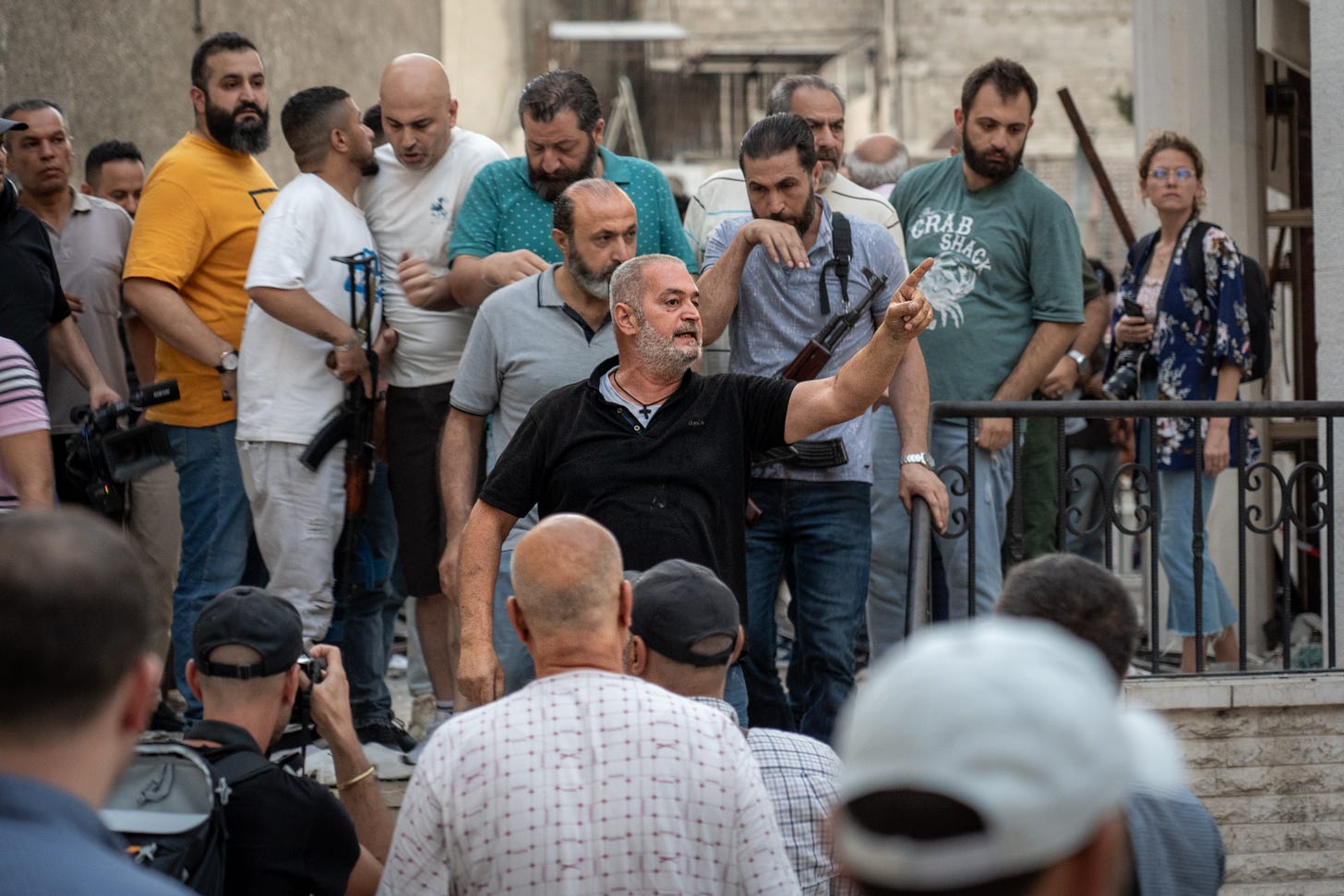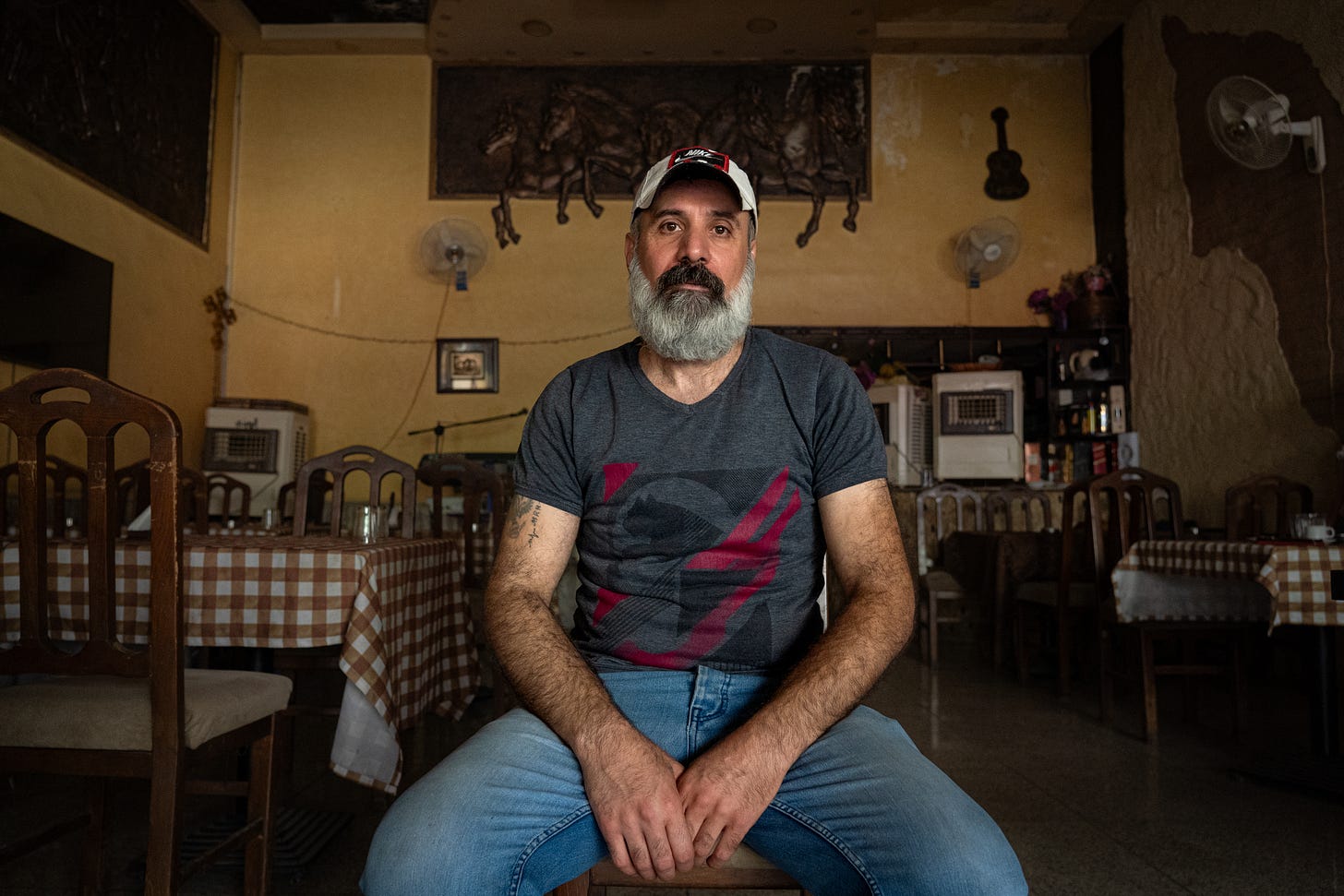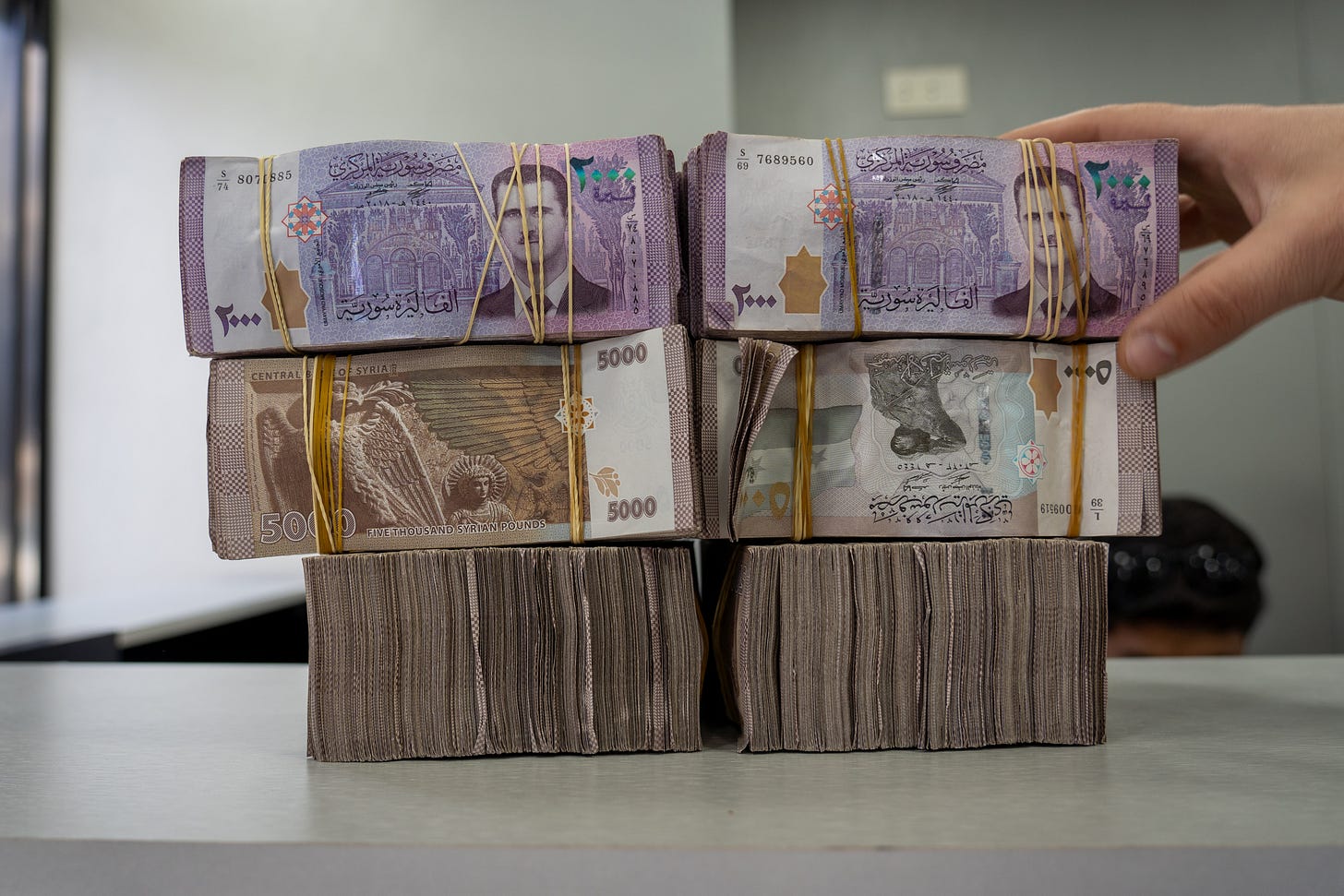This is a guest post from my son Daniel, a reporter and video journalist based in Istanbul, who has just returned from his second visit to Syria since the December revolution. The article was commissioned by the Hungarian website VALASZONLINE.HU, a beacon of brave, independent Hungarian journalism in difficult times. Many thanks to my colleagues there for their kind permission to publish the article in English. You can read the original Hungarian here.
All photographs © Daniel Thorpe.
Dangerous combination:
Guns and hunger in post-Assad Syria
Six months have passed since the fall of the Assad family dictatorship in Syria. Ahmed al-Sharaa and his organisation, Hay’at Tahrir al-Sham (HTS), have taken power. Once known as the notorious al-Qaeda organisation in Syria, they have tried hard to re-invent themselves as Islamists who negotiate with the West and appear moderate and tolerant. Their mission is Herculean: to end the bloodshed after 14 years of brutal civil war, unite the myriad armed groups and rebuild a crumbling economy. Sometimes they succeed, sometimes they fail. Istanbul-based journalist Dániel Thorpe returns to Damascus.
Mar Elias church, Damascus, 22 June 2025
I arrive at the scene half an hour after the bombing. All the streets leading to the site are blocked off, tense soldiers are checking IDs and searching everyone. The area around the church is littered with broken glass and tile fragments. The bodies have been removed from inside, but there are still pools of blood and human remains scattered on the ground. The crowds gathered at the site are a mixture of Christians, local gunmen and state soldiers. Everyone is shouting.
There are few countries more ethnically and religiously complex than Syria. Christians made up about 10 percent of the population before the war began in 2011, but this has now fallen significantly. They are not a homogeneous group, divided into many denominations, from Greek Orthodox to Armenian Catholics, Melkite Byzantine Catholics to Evangelical Protestants.
After the ousting of Bashar al-Assad in December, Christians, to the surprise of many, initially developed a good relationship with the new Islamist government. The looting of Christian neighbourhoods and the massacre of their inhabitants has been largely prevented. One of the cornerstones of Assad’s power was his threat that, if he ever fell, the Christians and other minorities would be massacred. Only he could protect this, he claimed.
Since he took power, interim President Ahmed al-Sharaa has personally received the leaders of the churches and promised to protect their communities. The interim Minister of Social Affairs and Labour, Hind Kabawat, is a Christian.
That initial confidence has been shaken. On 22 June, an armed Islamist walked into a packed Sunday service at the Mar Elias (St Elijah) Church in the Al-Dweilaa neighborhood of Damascus, opened fire on the crowd, then detonated an explosive belt. 31 were killed and 54 wounded.
"I was in my home, a few streets away, when I heard the attack," says George, a local man, "then I heard the explosion: it was different from the Iranian missiles that have been fired into our airspace recently. As soon as I arrived, I saw the chaos and smelled the blood. I couldn't enter. I am Greek Catholic, they are Greek Orthodox, but I certainly knew the dead - they may be my relatives. I feel numb."
The crowd gathered at the scene was rife with speculation about the identity of the attacker. "It was a Chechen, or some other Caucasian!" cries Mary, a local woman. “A radical Islamist came to this church recently to convert people to his religion. The security guards sent him away. This must be his revenge!”
Her guess was not completely unfounded. The government initially blamed the Islamic State, but the attack was eventually claimed by a relatively unknown jihadist organisation called Ansar al-Sunnah.
"After the provocation of Christians in Damascus against the dawa (apostasy) and the people of religion (...) our martyred brother Muhammad Zain al-Abidin Abu Osman - may Allah accept him - blew up the Mar Elias church," they wrote in their Telegram group. A spokesman for the Interior Ministry later confirmed that the new organisation was linked to the Islamic State and was operating under their control. They also said the attacker was not Syrian, but did not reveal his exact origin.
The Islamic State (IS) was formally defeated by the US-led coalition in 2018. They lost most of their territory and their leaders were killed. "We defeated ISIS in Syria," Donald Trump tweeted at the time. He rejoiced too early. The Islamic State survived the bombings and territorial losses, and chose a more decentralised way of operating in the deserts and urban pockets of eastern Syria. Last December, when the Assad regime collapsed, the organisation appeared to take advantage of the chaos and regain strength.
Two days after the attack, I return to Mar Elias. At the entrance, a small group surround a priest. He answers my questions reluctantly at first, then his anger breaks through. ‘Where is the government? We ousted Bashar and replaced him with al-Julani (the nom de guerre of al-Sharaa, still used by his critics today). Not much has changed."
The main complaints are that the government and secret services failed to prevent the attack, that their dead were not declared martyrs - as Muslims are - and President al-Sharaa did not come to offer his condolences in person, but only by phone.
"We are one people. The real Muslims, like this man, are with us!
says the priest, pointing to the guard next to him. ‘But the fake Muslims, like the president and the government, are different. We have lived in peace with Muslims for 1400 years. That is the Syrian identity. The fanatic ideology that gave birth to this attack came from abroad. There is no sectarian hatred or conflict here. The problem is with the government and its extremist ideologies.’ He declines to be photographed.
Preparing the coffins for the victims of Mar Elias.
That evening I talk with a Christian journalist I first met in January. At the time he was optimistic about the new leadership. He urged patience on those around him, who were highly critical of the government from the start. But now his tone is completely different.
"Christians feel like second-class citizens," he says. “The president is still acting like the leader of an Islamist organisation, not the president of Syria. This is because many of his followers consider Christians to be kafirs (infidels). This is the first such attack on Christians in Damascus since 1860. Of course there were kidnappings and executions during the war, but there was no targeted attack on this scale.”
"How can we trust them?”
Christians are not the only minority who are concerned. The Druze - followers of a monotheistic religion different to both Islam and Christianity, who believe in reincarnation and generally form closed communities - are also afraid. A suburb of Damascus and some settlements in the south are still controlled by Druze militia, not the new army. This situation escalated into a firefight in April. Although the guns are now silent, the tension is still palpable.
"We feel more secure now that we are in control of our own place and our own boys are keeping the peace. And keeping their guns," says Basel Abu Fakr, a cafe owner in the Druze-majority Jaramana neighbourhood of Damascus, "Now things are good here again because we locals - Druze, Christian, Muslim, Alawite - have stuck together. Our message to the government: treat us well, we will treat you well. But if you treat us badly, we will hit back.”
Basel Abu Fakr
The Alawites are in the toughest position of all the minorities.
The Assad family were Alawites, as were government ministers and army officers. For this reason, many people blame them collectively for the massacres and destruction perpetrated by the former regime. At the beginning of March, the cup of bitterness overflowed. Clashes erupted on the mainly Alawite-populated west coast between some remaining pro-Assad forces and the new army. The situation quickly escalated as tens of thousands of gunmen poured into the area. They included some from al-Sharaa's former organisation, the HTS, and many other radical rebel groups with dubious human rights records. The pursuit of pro-Assad forces rapidly degenerated into a massacre of Alawite civilians.
"Thirteen of my relatives were killed in a single week,” BK, a Syrian living in Ireland, tells me on the phone. “We were happy when the regime fell, we suffered under them. But what came after was perhaps even worse." According to reliable sources, more than a thousand Alawites were killed in a few days, most of them civilians. Al-Sharaa has promised to punish those responsible, but few have been held accountable, according to a Reuters investigation.
Hatred also simmers among the Sunni majority oppressed by Assad. "The Alawites have no religion," says Zakaria, a 24-year-old soldier who fought for the HTS for four years, "They were ready to slaughter everyone - Christians, Muslims, Jews, everyone. How can you trust them?”
When the Assad regime fell, many speculated that Syria might go the way of Iraq or Libya. The fall of Saddam Hussein in Iraq and Muammar Gaddafi brought only brief relief: chaos and violence returned. Today, both are failed states. Syria's future remains an open question - but its economy holds the key to the answer.
Checkpoint near Suwayda in southern Syria, flying the Druze flag
The sudden downfall of Bashar al-Assad had many causes, from the fact that his Russian allies were preoccupied in Ukraine, to corruption in the military. But even more significant than the military capability of the rebels was the demoralisation of the country due to economic collapse. Common soldiers of the regime were malnourished and lived in appalling conditions. The extortion and systematic looting of civilians was not just the result of cruelty, but often also of the need to survive. Few were willing to fight on an empty stomach when the rebels launched their offensive in November 2024.
The new government faced similar problems. It is hard to overstate the scale of the devastation wrought on this country by 14 years of civil war. As I travelled cross-country from the Turkish border to Syria's border with Jordan, I saw scarcely a settlement without houses blown up and roads trashed. Even in the capital, where the situation is the best, electricity is only available for ten hours a day.
The Syrian pound is so weak that people carry it in huge bundles. In restaurants, they bring a machine to count your banknotes with the bill. Because of the sanctions, payment by credit card or bank transfer simply does not exist.
Bundles of 5,000 Syrian pound notes - still with Bashar al-Assad’s image
In the Jobar district of Damascus, where fighting was particularly fierce, a group of men, women and children stumble through the rubble in the 38 degree heat. "This is Assad's legacy," says Salman, one of the group, who are collecting scrap metal to sell at the recycling plant. “I'm from here, from Jobar. This was a beautiful neighbourhood. Now there is nothing left - no houses, no infrastructure."
They earn roughly $2 to $3 per person per day from their work. And it's not without risk: large numbers of unexploded rockets, mortar shells and grenades lurk under the rubble. Sometimes they also dismantle and sell these too. But Salman is optimistic:
"I am sure that the revolution and al-Sharaa will rebuild Syria.”
Looking for scrap in the rubble, Jobar neighbourhood of Damascus
The government recently increased the salaries of public employees by 200 percent. But most still earn a similar wage to the scrap metal collectors in the Jobar neighbourhood. It is not enough to live on: the electricity bill for an average home is the equivalent of a full month's salary, or more. Most Syrian families have at least one relative who lives in Germany, Sweden or elsewhere in the West and sends home what they can afford each month. The low salaries of public servants carry the risk that corruption will return to all levels and organisations of the state.
Salman's optimism is shared by many, nevertheless, and not without reason. Donald Trump announced in May that the US would lift all US sanctions against Syria. These were as severe as those imposed on North Korea or Iran - completely crippling the Syrian economy and isolating it from world trade. The lifting of sanctions was perhaps the biggest gift to the Syrians since the fall of Assad. Trade can resume, and neighbouring countries seeking influence in Syria, such as Turkey or Saudi Arabia, can begin to rebuild.
Trump's pivot was historic. It came with a warm handshake with al-Sharaa in Riyadh, whom Trump described as a "handsome, tough guy". A few months earlier, it would have been unthinkable for a US president to say this about a former al-Qaeda jihadist who began his political career bombing US tanks in Iraq. After the fall of the Berlin Wall, they were the Western world's most feared adversaries. On 7 July the United States officially removed the HTS from its list of terrorist organisations.
Whether Trump's decision was premature or not, the lifting of sanctions gives the Syrians a chance to start afresh and rebuild their country. Without bread, even Sunni Muslims will quickly lose patience with the new government. Syria has two things in abundance: hungry, desperate people, and guns.
You can find earlier articles by Daniel Thorpe on Syria and Turkey, on Valaszonline at these links:
https://www.valaszonline.hu/2025/02/01/sziria-polgarhaboru-keresztenyek-maalula-kolostor-riport/
Valaszonline also has an English-language section, including Szabolcs Vörös’s remarkable interview with Ukrainian president Volodymyr Zelensky here.












